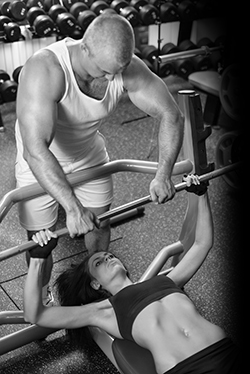IS YOUR TRAINER USELESS?

MUSCLE INSIDER Helps You Determine Whether or Not Your Personal Trainer is Really the Right Fit For You.
In the world of fitness, personal trainers can be instrumental in helping you reach your goals faster, from holding you accountable to not miss your workout to pushing you harder in the gym than you would on your own and doing so with proper biomechanics. But all trainers aren’t created equally, and while one may work perfectly for your mom, that doesn’t mean they’ll work for you.
Until recently, the majority of commercial gyms were big box corporations filled with high-tech equipment, spas for bathrooms, group classes, and, of course, juice bars as large as your typical supplement store! They had countless sales staff trolling the floors looking to sell personal training packages and touring new potential members through the gym floor while they sold the dream of fitness! Now, smaller cross-functional gyms that focus on one or two specialties are popping up. Many of these are personal training studios where training sessions are built into your membership fees. Additionally, online trainers have entered the industry, offering services to clients via email, WhatsApp checkups, private Facebook Groups for sharing tips, and Facetime words of encouragement now and again! There’s no questioning the fact that having a personal trainer is trendy … and expensive.
How Much Do Trainers Charge?
While prices will vary for one-on-one training based on the size of the gym, the clients’ goals, and the trainers themselves, signing a personal trainer contract often comes with a financing plan. Generally, hourly sessions with a trainer will run you around $60 to 70, but you may get a small discount if you sign up for multiple months. With many large corporations, the shortest plan offered is four months, which could bring your total up to $3,000. But no matter what your current goal is, if you’re paying to work with a trainer, you want to be certain your money is being well spent. How can you be sure you’re getting your money’s worth or if you’re simply paying someone to count your reps? Here are 10 things to consider when looking to hire a trainer or evaluating your current trainer.
Are They Qualified? 
In light of how trendy it’s become to have a personal trainer, gyms seem to have a never-ending supply for people looking for a trainer. While large corporate gyms will have specific expectations when it comes to certifications, this may not be the case for all fitness centres or online options. Unfortunately, there are no industry standards to follow, which means gyms can put someone in charge of your workout after a simple two-day course or, in some cases, no education whatsoever.
It may not even cross your mind to ask a potential trainer about their qualifications; you assume if a gym has hired them to do a job, they meet the necessary requirements. While this may be true in some cases, you must do your homework and ask some key questions:
• What training certifications do they have?
• Did they finish a university degree or college diploma? If so, what school and program did they graduate from?
• Did they take additional courses to continue advancing their knowledge in training?
• How long have they been training people full time?
• Do they hold any specialized certifications (e.g., pre- and post-natal, strength building, nutrition)?
• Have they ever worked with competitive bodybuilders or physique, bikini, fitness, or figure competitors?
• What have they accomplished with their own physique over their career?
You can use these questions to get started, but also think of other factors that are relevant to you and your goals.
Are You Making Progress?
If you hired the trainer to help you lose fat or gain muscle or both, have you seen the number on the scale drop, or are your clothes loose on you? If you wanted to increase your strength, are you progressively increasing the weight you can lift? There are endless ways you can measure your progress, as long as it’s related to your specific goal.
In all fairness to trainers across the world, you also need to be honest with yourself when it comes to progress. Have you truly stuck to the plan consistently and eaten what you should eat instead of what you want to eat? If you haven’t put in the work, you can’t hold them solely responsible. Remember, the time spent with your trainer is a tiny fraction of the week, and what you eat at the dinner table is even more important.
Are You Working Towards the Same Goal?
When you initially signed up, you should have discussed the goals you wanted to reach with the trainer’s help. This gave your trainer the direction needed to construct your plan. If you started your sessions in good shape and were looking to improve your strength, your plan shouldn’t be tailored for weight loss, nor should it have a heavy focus on cardio.
However, it’s entirely possible that your goals change during your time together, and your plan should reflect this new path. For example, after a couple of months geared towards weight loss, you now want to build some lean muscle. Therefore, you should see a change in your workouts to reflect this new goal.
A credible personal trainer should help direct you towards attainable and smart goals, but at the end of the day, once they’ve been set, your plan needs to be structured to help you reach them.
 Do Your Schedules Match?
Do Your Schedules Match?
You’ve met your trainer, completed the paperwork, set your goals, and established a game plan for your sessions. Great! Then you go to book your sessions and realize they’re fully booked with clients in the prime-time slots you were hoping for. Or, you’re starting to find that it’s increasingly difficult to reschedule sessions when things come up. Your schedules just don’t seem to work together at all.
Unfortunately, no matter how much you think a trainer can help you, if you’re unable to schedule sessions with them, you can’t reap the benefits. If this is the case, you may need to talk about transferring your plan to a different trainer at the gym to ensure you get all your sessions in.
Personality Conflicts?
I’m not saying you need to be best friends and go for coffee on a weekly basis, but you should like them enough to enjoy spending your sessions with them. As humans, we all have very different personalities—that’s what makes the world an interesting place—but the reality of it is that we won’t mesh well with everyone we meet. If you’re a quiet, introverted person, you may not enjoy a very loud, boisterous trainer.
On the flip side, if you find that you and your trainer have become better friends than work partners, your success may suffer. This could lead to your trainer not pushing you as hard as necessary, or chatting about your weekend plans instead of setting new PRs.
If you find that you don’t look forward to your training sessions due to personality differences, take it as a sign that your trainer isn’t right for you.
 Do Your Workouts Change?
Do Your Workouts Change?
Signing up with a trainer for any length of time, whether it’s four months or an entire year, should come with a guarantee that you’ll experience a variety of workouts. There are a few factors to consider when examining your workouts, such as training principles and muscle groups worked.
• Does your trainer alternate through different frequencies of sets and reps? In order to reach your goal, there will be optimal rep ranges to work within, but that doesn’t mean this factor should remain the same throughout the whole workout, or for months on end. Utilizing various training principles will have a lot of benefits towards continuing your progress.
• Do your workouts address all muscle groups? If you find that your workouts have predominantly focused on one or two muscle groups, you have every right to raise your concerns to your trainer. As well, a variety of exercises should be used to avoid overuse injuries.
Do They Push You Hard Enough?
One of the main benefits of hiring a personal trainer is the added push they provide. Whether that means encouraging you to go for a few more reps or adding a little more weight to the bar, this push is often what’s needed to make continual progress. However, this push can sometimes go too far. If your trainer continues to increase the weight you’re using with no regard to your form, or they aren’t listening when you feel discomfort, you may be on different wavelengths.
There is a happy medium where you can be pushed in a safe way that makes you feel confident and comfortable. This doesn’t have to come at the risk of an injury or via screaming in your face to work harder. Lastly, if your trainer is simply counting your reps, get rid of them. You can do that yourself.
Are Your Workouts Safe?
When you work with your trainer, you should feel like your safety is a priority. You should be encouraged to thoroughly warm up before your session starts, and then progressively work your way up in weight—never jumping right to your one-rep max.
Another way a trainer should make you feel safe is by keeping an eye on your technique. As you perform your reps, their attention should be on your biomechanics from a variety of angles, and they shouldn’t hesitate to provide corrective feedback as needed. Too often, trainers become distracted by other people in the gym, their cell phones or social media news feeds, checking themselves out in the mirror, or telling you about the latest drama in their lives! When you first sign up, it’s best to tell your trainer you fired your last trainer because they did all of the above and that you don’t want to see this take place when you’re training together. It seems harsh, but you will earn their respect for it and you’re giving them the best chance possible of keeping you as a client.
Are Your Workouts Productive?
When working with your trainer, be aware of what you spend the majority of your time doing. Are you talking too much between sets? Do they spend a lot of time setting up elaborate circuits? Do they simply chat with you while you do cardio?
While it’s nice to have company during cardio, or to know they’re putting some effort into making your workouts challenging, the time you spend with a trainer should be focused purely on the workout. Remember, this is your money being spent. Obviously, not every single minute of your session will be spent working, but you shouldn’t leave a session feeling as though you paid for a friend.
 Do They Motivate You?
Do They Motivate You?
This factor is very subjective, and it may not matter to everyone. However, if you’re paying a trainer to help get you into shape, you should find them motivating, inspiring, or at the very least, intimidating enough to keep you working at your highest level.
This doesn’t mean they regularly cite inspirational quotes while you squat, or that they continuously tell you how amazing you’re doing. These traits may happen organically, due to inherent traits they have. Maybe it’s the fact that they walk the walk of a healthy lifestyle, or that they’re genuinely invested in your progress, or they’ve shared stories of struggles they’ve personally faced. No matter what the reason is, if you find them motivating in any form, it’ll go a long way in continuing your progress.
If you doubt this factor, look at things from the opposite side. If you don’t find a trainer motivating at all, how likely are you to look forward to your sessions, push yourself harder, or sign up with them again? Not very likely.
Get Your Money’s Worth
If you find yourself in the market for a personal trainer, or have been working with one for a number of months, take the time to consider these 10 factors. The relationship between an athlete and their trainer is multi-faceted. You need to consider physical, mental, and emotional aspects of the relationship to truly know you’re getting your money’s worth from your sessions.
The bottom line should always be your satisfaction with the service you’re receiving. If you’re making great progress with them, then keep sweating it out with them. If you’re a little less certain, be loyal to yourself and your goals, and discuss your concerns openly with them or speak with the club manager. Many clients make excellent progress by switching trainers every four to six months to learn new training styles and motivational techniques and to keep things fresh and exciting. Remember, you’re not paying to have a friend; you’re paying to make the best gains possible.

